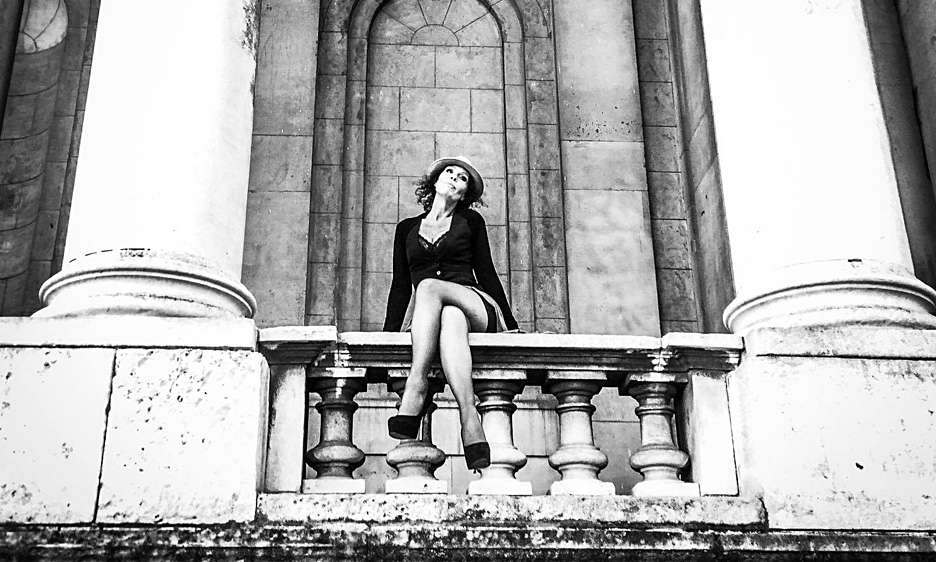Home » Jazz Articles » Catching Up With » Fiona Ross On Red Flags And High Heels
Fiona Ross On Red Flags And High Heels

Courtesy Darrell Craig Harris
I realised I was writing about the emotional highs and emotional lows of life, not just my life but others.
—Fiona Ross
All About Jazz: Can you tell me about the genesis of Red Flags and High Heels?
Fiona Ross: I have been very fortunate over the past few years to be full of ideas and the ability to write, so I've had a plan that while the ideas are there, to try and release an album every year. I never have any clearer plans than that, so decided it was time to start the album, sat down and started writing. I have no idea what my music will be until I start, but generally, after a couple of songs, a theme of sorts comes out. Once I get in the flow, I'm away!
AAJ: Where did the title come from?
FR: After I had written "I Always Saw the Red Flags Flying" the theme of red flags stuck with me and I reflected on some of the songs I had already finished, and a theme was there. I realised I was writing about the emotional highs and emotional lows of life, not just my life but others. The "Red Flags" representing those things that just don't sit right with you; people's ignorance, people being unkind. Those things you know you shouldn't do, but you do anyway, and you have no idea why you did them until after it has all gone wrong. But also the good things, the fun, both lyrically and musically. There is a feel-good factor in some of my music, I hope. For many, high heels bring to mind something sexy and playful, while for others they represent power, strength and freedom. So Red Flags and High Heels became the name and I then wrote the title track to solidify it all. That was actually the penultimate track I wrote.
AAJ: How did you choose the players?
FR: I always have my 'home' musicians for my albums, so the musicians I gig with, although this album is the first time, I have Dave Boa on trumpet, which was wonderful. We had been gigging together since my last album. Although we are not 'a band' as such, we have such amazing chemistry and have so much fun, musically and socially, when working together. I like to think we understand each other and although it is my music, I try to ensure everyone has a space to be and to shine. That's very important to me. It has never occurred to me to work with anyone else for my albums. I did have a few amazing guests on my last album and was very lucky to have Kim Cypher guest on this one, but that is one of the impacts of the pandemic actually. I did have plans for some other guests, but as travel etc was so up and down, I decided to not go with anyone other than Kim.
AAJ: How have the last two years impacted on you, as an artist?
FR: Well, obviously, I grow and develop all the time and have grown up with an analytical mindset, but the pandemic forced a different level of reflection and critical analysis. I have become more aware of the importance of kindness and empathy in a world full of people who are ignorant and are not kind. For example, Donald Trump and the Black Lives Matter Movement demonstrated the power of ignorance but also the power and necessity of kindness and unity. I have an increased lack of tolerance of selfishness and untruths. This impacts not only on the music I write, but on my desire to support other people whether that is publicly or behind the scenes. My journalism work and my organisation Women in Jazz Media allow me to publicly promote and platform people, but I consider checking in on my elderly neighbours and training as a mental health first-aider of equal importance. If I can do something to help someone, then I do. This is not about me being a 'good' person or anything like that, I believe it's just being human. Shouldn't we all be doing what we can for each other?
AAJ: What was the thinking behind including the live tracks on this release?
FR: I recorded a few live sessions during the lockdown period, but only released them as videos, so I wanted to include them on my new album. It's nice to share some new arrangements of some of my early songs, which I always perform live and always go down well with the crowd. "Without You" and "Too Many Thoughts" were recorded live at The Premises Studio in London and form part of my Live Sessions video album. We recorded those as soon as the first lockdown was lifted and we were allowed to get together, with precautions of course. "I Followed My Heart" was recorded in St Cuthbert's Church in London, literally two days before lockdown and "You Can Smile" was a live studio session that we did straight after the second lockdown. So, there is a whole lockdown live theme going on with those.
AAJ: Where does your love of jazz originate from? Do you come from a musical family?
FR: My immediate family were/are all mathematicians, but huge music lovers. My father was a huge lover of jazz. Mostly early jazz—Louis Armstrong, Bix Beiderbecke, Bob Crosby—but he also loved Nina Simone and Ella Fitzgerald. The soundtrack of my upbringing was incredible. I didn't really start to explore jazz myself until I was about 11/12, when I discovered Oscar Peterson and Billie Holiday. I spent hours trying to play Oscar Peterson transcriptions and fell in love with the Night Train album. I bought a cassette (yes, cassette) of Billie Holiday's greatest hits, as I had heard she was important and thought I should explore her work. I was transfixed with "Strange Fruit." This was when I first became aware of racism and that music was the place to put your pain.
AAJ: Are there any musicians in particular who you feel have influenced your playing style?
FR: There are so many amazing musicians that have always inspired me. I think that perhaps the diversity of those influences has had an impact on me. Growing up, my brother was into Rickie Lee Jones, Joni Mitchell, Kate Bush—some of the great female songwriters—but also Billy Joel, The Eagles etc, and I was always captivated by their music from a young age. I was trained in musical theatre and was brought up watching all the fantastic Hollywood musicals, anything with Gene Kelly, Ann Miller, Cyd Charisse, Fred Astaire, etc. I was a classically trained pianist, but secretly spent hours trying to play Oscar Peterson transcriptions, wishing I had bigger hands. My teenage years were at the time of Whitney Houston, Anita Baker, Prince...and then as I developed and studied more, Michel Camilo and Hiromi became huge role models for me.
AAJ: How did you find the contemporary jazz scene—it seems to be undergoing a revival?
FR: I believe people are becoming more open to music that comes under the heading of jazz. People often mention a revival, but I don't think jazz ever went away, so I think it's more about new artists bringing something new to the scene, which is as it should be. Jazz is ever evolving and must be given the space to do so. There definitely seem to be more younger jazz artists, which is wonderful, and women are being given more platforms, which is well overdue.
AAJ: Can you tell me about your writing process?
FR: I write on the piano I have had since I was six, which is when I started learning. My writing comes in different ways and I very much just go with the flow and write whatever is in my head at the time. Sometimes it's a bass line, so for example with my new track, 'More Time,' I was thinking about how busy everything is and rushing around and that led me to a be bop inspired bass line, so that came first. I also knew I wanted to have a trumpet and sax battle, a conversation. But I also wanted to contrast the busy with calmness, so the idea of the cowbell prominently keeping time in my B-section of the song came after that. But sometimes it's a groove that comes first. With "Don't Say It if you Don't Mean it;" I decided I wanted to have a bossa on the album. No idea why, just liked the feel. So that was the starting point for that track. With "I Always Saw the Red Flags," I wrote the bass line first and then the muted trumpet motif, to emulate a call to attention, the red flags warning.
AAJ: And the lyrics?
FR: Lyrics are slightly more complicated for me. With this recent album, they came later than they normally do. I write bits of lyrics with the music— maybe a chorus, an opening line or a verse—but I always tidy up the lyrics at the end. I must add though, that sometimes the lyrics and music come at exactly the same time. "The Apple Trees Don't grow Anymore," for example. I guess I don't really have any sort of process for writing, but everything is connected throughout the process, from me sitting down at the piano to start, to ensuring that muted trumpet is in the right place in the mix—a granular beginning the develops into something holistic I guess.
AAJ: How do you work your compositions up to the finished piece?
FR: Next stage is going through the songs with my bassist and drummer. This is when I sometimes realise I have written hard bass parts, when I see the sweat pouring out of my bassist Derek's brow. We did even have a session when his fingers started bleeding. But my favourite part, by far, is writing and arranging the brass. I only have one trumpet player and one saxophonist (Dave Boa and Loren Hignell) so the layers are epic to make it sound full. We have lots of fun with these. There are times, when I add yet another brass part, that my engineer thinks it's maybe too much, and I just say, "trust me, it'll work," and there are times when the harmonies I write are questioned, but then when it is all finished, everyone agrees it worked. Thank goodness.
AAJ: Am I correct in that you also produced this album? Is that a new step for you? How did you find the experience?
FR: Yes, I did! I produced my last four albums actually, so not a new step but of course I grow and develop in this area with each album. I always strive to achieve a production that sounds as real and live as possible. So, if you came to see me play live, it would be pretty close to the version you hear digitally. I also value the importance of different sets of ears and environments. So, I record in my guitarist's (Gibbi Bettini) studio, but then mix the album at another studio (Highfield Studio) and then of course mastering, with an incredible mastering engineer, Nick Watson. His ears are his superpower. All the people at those studios have different (and incredible) skills sets, so that allows me to consider their thoughts and expertise and helps me decide on the direction of the production. I especially enjoy mixing the album, although it's time consuming, and the final mastering stage is just fascinating. Mastering is almost like a dark art. I just watch and wonder at that stage.
AAJ: What's next?
FR: Staying alive and reasonably sane. At the moment gigging and hoping to gig outside of the UK, when the environment has settled down, both in terms of Brexit and Covid. I am desperate to play abroad. Also, I'm busy with my journalism work and the organisation I founded, Women in Jazz Media. I will start thinking about my next album in the new year too.
Tags
PREVIOUS / NEXT
Fiona Ross Concerts
Support All About Jazz
 All About Jazz has been a pillar of jazz since 1995, championing it as an art form and, more importantly, supporting the musicians who make it. Our enduring commitment has made "AAJ" one of the most culturally important websites of its kind, read by hundreds of thousands of fans, musicians and industry figures every month.
All About Jazz has been a pillar of jazz since 1995, championing it as an art form and, more importantly, supporting the musicians who make it. Our enduring commitment has made "AAJ" one of the most culturally important websites of its kind, read by hundreds of thousands of fans, musicians and industry figures every month.























